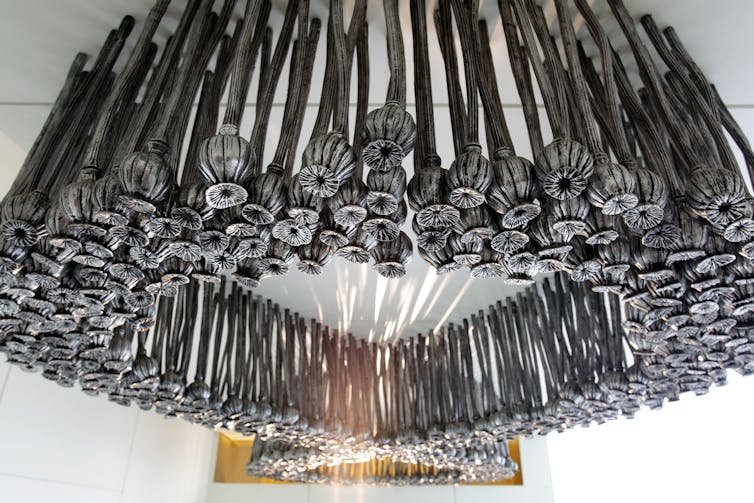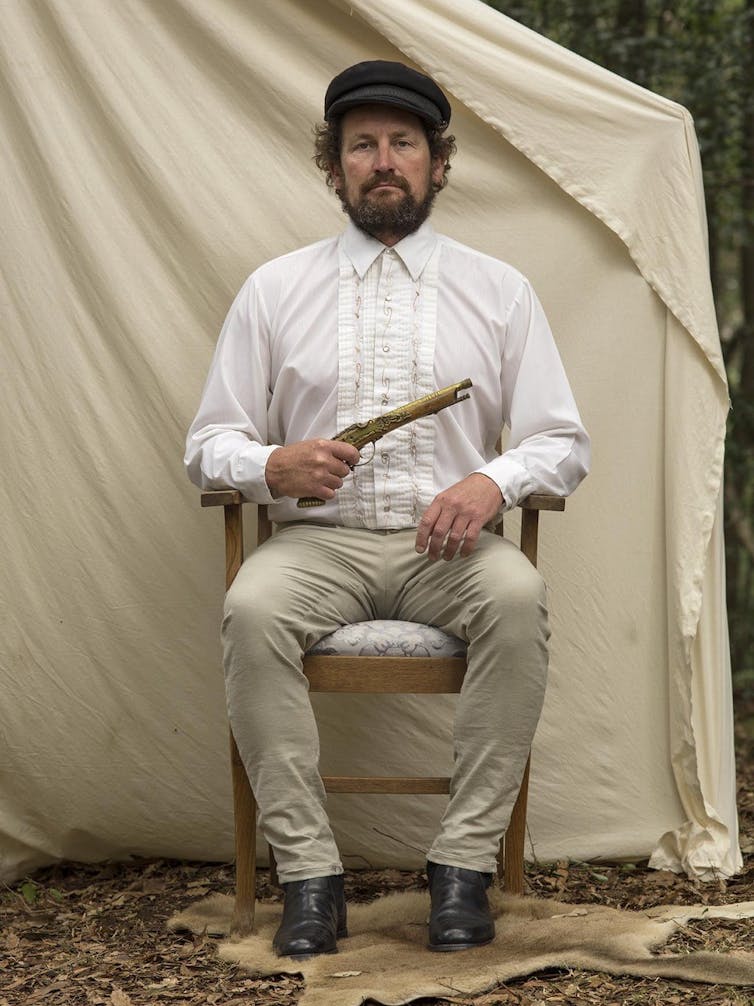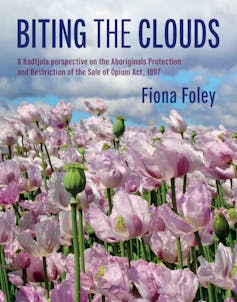Review: Fiona Foley's Biting the Clouds is a visceral look at opium and control on the colonial frontier
- Written by Maria Nugent, Co-Director, Australian Centre for Indigenous History, Australian National University
Review: Biting the Clouds: a Badtjala perspective on the Aboriginals Protection and Restriction of the Sale of Opium Act by Fiona Foley, UQP
In late 1897, the colonial Queensland parliament introduced the oddly named the Aboriginals Protection and Restriction of the Sale of Opium Act, joining colonial panic about Aboriginal people’s opium use with a new regime of protective governance.
Concern about this — especially the use of charcoal opium, the toxic ash left in pipes — had been growing since the 1870s, and there was evidence opium was being used as payment for Aboriginal labour and sex.
Penalties for opium supply to Aboriginal people were included in the new legislation, but the Act was mainly designed as a program of protection, structured around establishing a series of large reserves to which Aboriginal people were forcibly removed.
Aboriginal people throughout the colony were placed under an intrusive and destructive regime. Few escaped the tendrils of the legislation into their lives during the 20th century. It affected every Aboriginal family in the state.
Memories of being “Under the Act” (the title which Willie Thaiday gave to his powerful memoir published in 1981) still remain strong.
Read more: Enforcing assimilation, dismantling Aboriginal families: a history of police violence in Australia
Making the hidden visible
Badtjala woman and visual artist Fiona Foley has re-searched and re-presented the 1897 Act through her art and, more recently, in her doctoral studies.
This has involved creating a series of public artworks that engage with the Act and what she describes as a “hidden history” of the use of opium as payment to Aboriginal people.
One such a work is Black Opium (2006): 777 cast aluminium poppy heads arranged in an infinity shape hang from the ceiling at the State Library of Queensland.
 Black Opium, commissioned by the State Library of Queensland, 2006.
UQP
Black Opium, commissioned by the State Library of Queensland, 2006.
UQP
Foley describes the work’s effect as “stunning and sombre”.
Located in a void in the building and looking down over four stories, she says the piece references a “collective amnesia” about opium in colonial Queensland.
Foley spells out her long engagement with colonial and Badtjala history and The 1897 Act in her new book, Biting the Clouds, a euphemism for opium use.
Based on Foley’s doctoral thesis, Biting the Clouds is designed to accompany the short films, public art installations and other creative works she has produced over her career. Taken together, they provide powerful interpretations and accounts of a history so violent, so elusive, and so destructive it takes a mammoth effort to fathom.
This is Foley’s gift: she refuses to turn away from this difficult-to-detect and hard-to-face past.
Grasping for truth
In her photographic series Horror Has A Face (2017), Foley creates vividly and opulently imagined scenes of opium dens.
“As I am not bound by accuracy”, she writes, “here I have allowed this scene to be as rich and flamboyant as I dare imagine”. These creatively reenacted scenes open out onto new understandings of Aboriginal people on Queensland’s colonial frontiers.
In other images in the series, she uses models to re-photograph notorious historical figures in Queensland, such as erstwhile politician and protector Archibald Meston and Anglican missionary Ernest Gribble.
 The Protector, from the series Horror Has a Face, Fiona Foley, 2017.
Courtesy of Andrew Baker Art Dealer
The Protector, from the series Horror Has a Face, Fiona Foley, 2017.
Courtesy of Andrew Baker Art Dealer
In these images, Foley prompts the viewer to see beneath the casual respectability presented by their faces to the world, and to bring to mind the part the archetypal “protector” and “missionary” played in determining Aboriginal people’s lives and futures.
History’s hurts
One of Foley’s themes throughout the book is the ways in which history hurts — and not only history in the sense of what has happened in the past. Rather, history as the accumulated and authorised body of knowledge: knowledge subsequently produced and consumed as a truthful account of what happened.
Read more: For Aboriginal artists, personal stories matter
For Foley — as for others — the silences, obfuscations, mistakes, denials and rationalisations of history have the power to produce a new set of harms, experienced by later generations as a form of re-traumatisation.
 Biting the Clouds is an eloquent example of the ways in which the visual arts — through a deep and visceral engagement with memory, experience, emotion and story — can mediate and remediate the force of inherited histories on contemporary experience.
In this regard, the book’s title takes on another meaning: an evocative metaphor for the experience of trying to reach back into the past and grasp its truths. Like clouds, the complex reality which one tries to grab dissipates or shifts shape the closer one gets to it.
That is the quality of the frontier.
The historian Tom Griffiths once remarked: “When, as historians, we get close to the ‘frontier’ — that dangerous site of cultural encounter — we often find it evaporating either into intimacy or distance.”
Facing horrors
This work of approaching the frontier is not the preserve of professional historians alone. We all must turn to face the colonial past. When we do, the challenge is to see it with the clear-eyed and steely gaze it requires.
That is what Foley offers us in this book: a candid account of her own monumental effort to look and to see.
And by giving colonial horror a face that appears at once familiar and strange, she challenges us all to do the same.
Biting the Clouds is an eloquent example of the ways in which the visual arts — through a deep and visceral engagement with memory, experience, emotion and story — can mediate and remediate the force of inherited histories on contemporary experience.
In this regard, the book’s title takes on another meaning: an evocative metaphor for the experience of trying to reach back into the past and grasp its truths. Like clouds, the complex reality which one tries to grab dissipates or shifts shape the closer one gets to it.
That is the quality of the frontier.
The historian Tom Griffiths once remarked: “When, as historians, we get close to the ‘frontier’ — that dangerous site of cultural encounter — we often find it evaporating either into intimacy or distance.”
Facing horrors
This work of approaching the frontier is not the preserve of professional historians alone. We all must turn to face the colonial past. When we do, the challenge is to see it with the clear-eyed and steely gaze it requires.
That is what Foley offers us in this book: a candid account of her own monumental effort to look and to see.
And by giving colonial horror a face that appears at once familiar and strange, she challenges us all to do the same.
Authors: Maria Nugent, Co-Director, Australian Centre for Indigenous History, Australian National University




